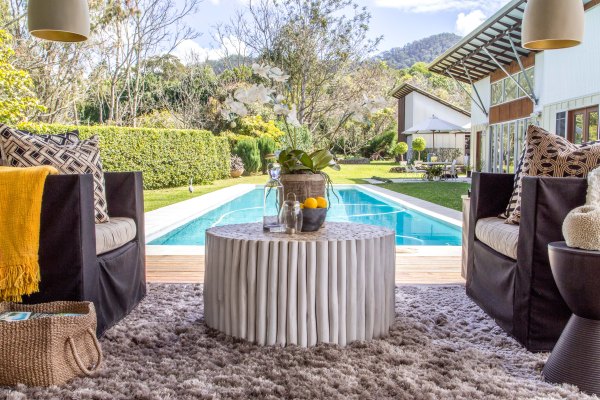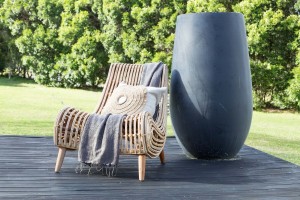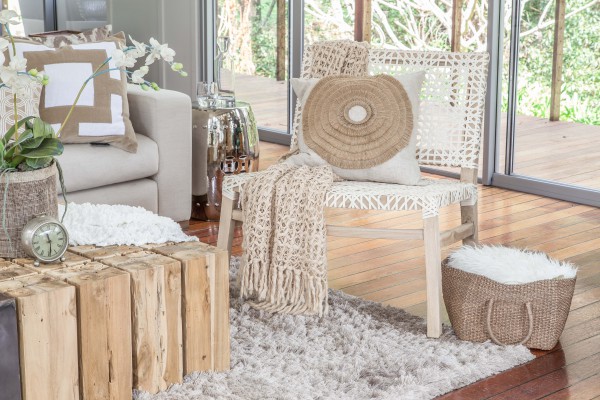Charl van Heerden established Uniqwa Furniture Collection in Queensland in 2009. The location offers van Heerden and his young family an active yet relaxed outdoor lifestyle that is reflected in the range of furniture and accessories the company supplies to the residential and commercial design market.
“We love the outdoors, we love camping on the beach, we love spending time as a family and we saw that Queensland had that to offer,” he says.
Uniqwa counts among its clients new home builders such as Henley Properties and Dennis Family Homes in Victoria, and Adenbrook Homes and Plantation Homes in Queensland. Van Heerden says they are also currently working with Niramaya Signature Resort in Port Douglas, supplying accent pieces to enhance the overall design theme and coordinate with existing commercial furniture.
It’s the holiday season and he is at home arranging furniture and preparing for guests later that day. Our conversation is accompanied by the occasional sound of native birds in the background.
“We’ve got a beautiful property with acreage, lots of wildlife and our furniture throughout,” he says. “We do enjoy it.” And the environment sounds like the perfect setting for pieces that are featured on the Uniqwa website.
Central to the business philosophy is the aim to provide unique contemporary designs that are influenced by nature and ethnic cultures. Sustainability, the unique quality of handmade furniture and accessories and the combination of textures to create a tactile, earthy environment are ideas that feature often as van Heerden talks about his business.
The company’s online presence is designed to capture the essence of this philosophy. Each image is carefully curated like room settings in a showroom and project images show how the product has been used in commercial or residential settings. With insight gained over the last several years, van Heerden and his team have grown to understand that the right kind of imagery and styling plays a major part in engaging the imagination and interest of clients.
“Even though people do still love to touch and feel furniture and go to trade shows and showrooms, the experience starts online,” he says. “Your website needs to give that similar experience that people would have had going into a showroom where they want to see the furniture presented. They don’t want to just see what it looks like they want to see how it can be used and how it looks in situ.”
Van Heerden took a slightly circuitous route to get to this point with his business and it hasn’t always been smooth sailing. Trial and error, good timing and bad timing mixed with sheer determination, belief, serendipity and a love of furniture has seen the company begin to thrive over the past year.
As a young man growing up in Cape Town, South Africa, van Heerden had intended to divide his time between work and his passion for furniture. It hadn’t occurred to him how he could develop a career around something he considered to be a hobby. So he embarked on a business degree in commerce and marketing only to change tack after discovering that he could merge work and play with furniture design and manufacturing.
He left South Africa for Australia and enrolled in a Diploma of Furniture Design and Technology at RMIT in Melbourne. As he learnt more about furniture production, he became inspired by the beauty of handmade pieces, natural materials, a sustainability ethos and ethnic cultures. The idea of packaging all these ingredients into beautiful and functional pieces of furniture became his motivation.
The name ‘Uniqwa’ – a twist on the word ‘unique’ and a simple way to capture the principle idea behind the brand – evolved during his studies at RMIT. “We were encouraged to start developing our own brand back then and I was quite fresh out of South Africa at that time. It still had a predominant influence in my life,” he explains.
“We are all inspired by different natural elements around the world so I wanted to develop a company that helped to bring those experiences and memories that people gather as they travel,” he says of his aim to reproduce those feelings through the way people decorate their homes.
It’s a testament to van Heerden’s resolve and his supportive family that Uniqwa survived the Brisbane floods of 2011 and an attempt to break into the North American market in the same year.
“It was a very bad year in the American economy,” he explains. “So on top of that and being flooded we had to put things on hold and really just try and keep our head above water.” While others may have given up on their dream, van Heerden says there was nothing else he wanted to do.
The last year brought many opportunities. “We’ve had a fantastic year,” he says of 2014. “We’ve introduced some new products which the market has responded really well to and it has given us the wind beneath our wings to go forward again.”
Step by step breakthroughs begin with sourcing the right product that fits within the business philosophy and enhances the brand. As the range continues to expand, it naturally begins to reach a wider market which leads to more opportunities and connections with designers and other established brands.
Prior to establishing Uniqwa, van Heerden worked as an operations manager in the furniture industry where he learnt the skills and know-how of managing an importing furniture business. He initially designed the majority of pieces for Uniqwa and now undertakes two overseas buying trips a year and is still heavily involved in the design process, suggesting concepts and ideas with the factories he collaborates with.
“Of course having that background we are heavily focused on quality control, improving continuously everything that we do and not just finding a product and selling into the market. We are continuously focused on development.”
A lot of the inspiration for new product is borne in the resorts of South Africa and other African resort destinations with manufacturing done in South East Asia.
“We don’t really scout out trends and try and follow trends. We see where there is interest in the market but we always try and add our own element to make it unique,” he says. “If other people are doing product we do, we will probably stop doing that. We don’t want to compete in the market with the same product. We want to compete in the market in uniqueness.”
After establishing Uniqwa in 2009, the company moved quickly to exhibit at Furnitex in 2010 and 2011. This year, they are excited to be returning to Decor + Design in Melbourne to launch several new pieces and get in front of the local market again.
Their product hits the spot for contemporary casual living and outdoor furniture. Van Heerden sees a trend towards more raw and natural products and away from 100 per cent synthetic products that are typical of the outdoor market. He notes that clients are leaning towards more natural materials. “There’s definitely a focus on outdoor fabrics and increasing the variety and options and almost bringing an inside look to the outdoors,” he says.
“We don’t feel there needs to be a different look just because furniture is used in a different application. Obviously the materials need to be able to handle the extreme conditions that Australia throws at us but if we can incorporate an indoor look or relaxed look it doesn’t matter whether it’s used indoors or outdoors as long as it fits the theme you want to achieve.”
Van Heerden also supplies Cocomosaic which is a feature wall product that is made from the shell of a coconut tree or recycled timber depending on the product and the range.
“It’s something that is produced 100 per cent from the natural process of nature. It’s a product that offers a lot of texture and we are heavily focused on natural elements and texture,” he says of the decision to take on the Australian and New Zealand distribution for the product. “People like to create depth and feeling and because we were working with the interior design market, we felt it would be a perfect product to complement what we were already doing.”
In terms of sustainability, he says that Cocomosaic has a great sense of social responsibility “and that connected very well with us and who we are as individuals and what we believe in life. And it fitted into not only the business side but our personal values as well.”
What began as a love of furniture and hobby for the young man from Cape Town has become a constant at every stage of his life. It’s a business and lifestyle that he is passionate about sharing with his family, the design community and the wider market.
“It’s the one thing that ticks all the boxes,” he says.





